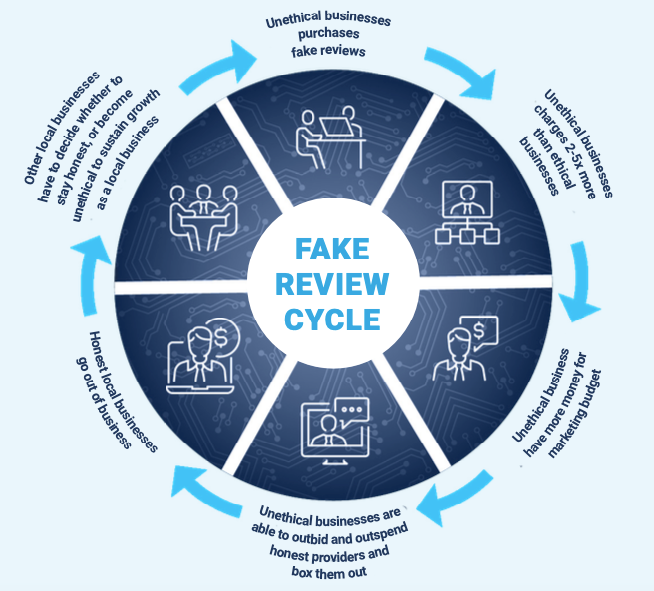DOJ: Sell Chrome, Fake Reviews = $300 Billion, ChatGPT Gaining Share

DOJ's Google Reckoning
The US Department of Justice (DOJ) filed its Proposed Final Judgment in US v Google, which the company lost earlier this year. Here's what the DOJ is now asking for: 1) sale of Chrome, 2) potential divestiture of Android if other anti-self preferencing measures fail, 3) no more default search deals, 4) licensing/sharing of Google's search data to rivals for 10 years, and 5) multiple restrictions around Google AI. The latter would include no self-preferencing in AI products (e.g., AIOs, Gemini), disclosure of AI training data/sources, letting publishers to opt out of AI training, query data sharing with rivals and no investing in AI rivals. The sale of Chrome could be worth $20 billion according to Bloomberg estimates. The loss of Chrome would eliminate valuable clickstream and user data and a major source of search query volume. While divestiture of Android is on the table, it's a backup if other "behavioral remedies" (e.g., no mandatory pre-installed Google apps) don't improve competition. This is an ambitious remedial "ask" by the DOJ. It's not clear how much the court will embrace.

Our take:
- Mindful of US vs. Microsoft and the potential to be overturned on appeal, the trial court may steer clear of seemingly harsh "structural remedies."
- Google will appeal any decision the court makes and that could play out over years, during which time nothing would happen.
- Trump has said he wouldn't break Google up; his takeover of the DOJ happens in January. They could reverse course and settle accordingly.
High Cost of Review Fraud
What is the cost of review fraud? According to a new study from The Transparency Company, it's potentially hundreds of billions of dollars. (Disclosure: I'm one of the report authors.) In 2023, the company examined 73 million reviews in Home Services, Legal and Medical and determined that review fraud in those categories was responsible for an estimated $300 billion in annual consumer harm. That takes the form of higher prices, remedial spending and/or actual losses as a result of fake or illegitimate reviews that prompt consumers to choose inferior, unethical or fraudulent service providers. The Transparency Company found that in these three verticals 13.7% of reviews were likely fake (with high confidence). In addition, the study found that AI-generated reviews accounted for 3.1% of the suspicious review dataset. AI usage in review fraud has surged, growing 80% month-over-month since June 2023. The 73 million reviews generated an estimated 62 billion impressions. Of those, fake reviews saw an estimated 8.5 billion impressions, which was combined with a conversion metric and multiplied by the average cost of services, resulting in the overall harm figure.

Our take:
- One of the important points made in the report is that, beyond consumer harm, fake reviews also hurt ethical businesses that play by the rules.
- In a 2021 Transparency Company - Uberall study, suspicious review percentages ranged from 1% to more than 20% in some categories.
- Since then, Google has tightened up fake review enforcement (partly in response to the EU's DSA). Q: what's an acceptable % of fake reviews?
ChatGPT Is Gaining Share
Rand Fiskin, using multiple data sources, has loosely calculated that ChatGPT has captured just over 4% of "cross-platform" search volume. Google has 83.5% by comparison. But ChatGPT's share is greater than Bing's and about two points less than YouTube's. The remaining 3.4% is an amalgam of multiple other sites including Facebook, Reddit, Linkedin, Pinterest and Perplexity. Separately, Marcus Tober discusses the overlap in results between ChatGPT, Perplexity, Google and Bing. He found a strong correlation between Google rankings and Perplexity results, less so with ChatGPT. Add to that a recent unpublished consumer survey (n=1K adults) from Dialog, comparing search and AI usage. These were all people who used search engines at least monthly and had used an AI application (e.g., ChatGPT) at least once. Respondents repeatedly favored Google but 26% said they were now using conventional search engines less. And a majority thought that AI would replace traditional search within three years.

Our take:
- There's an ongoing debate about whether Google will lose meaningful share to AI engines and whether it will impact ad revenue.
- Multiple forms of data and anecdotal evidence argue that usage of ChatGPT as a search substitute (for informational queries) is growing. But Google ad revenue may not be affected or marginally impacted.
- There are more AI-powered Google competitors on the way.
Support Near Media
This is one of our last ungated newsletters, as we move most content behind the paywall. Over the past nearly four years we've published almost 500 newsletters and scores of deeper-dive analysis pieces. We're also approaching our 200th podcast. Over that time we've received lots of positive feedback from our readers and listeners. This has been for a long time a labor of love but it can't continue that way unfortunately. David, Mike & I bring many collective years of experience to Near Media and the research we're doing. But it takes a big chunk of time to keep it going. And to keep it going we've made the decision to ask for support from our audience. We're asking for $20 a month or $200 a year if you pay annually. We've had a positive response so far. We hope you'll consider supporting our work, if you find what we're doing valuable.

Three ways to support us:
- Subscribe for $200 (or $20 per month). Get your company to pay; we have discounted "bulk" options.
- Sponsor the podcast (contact us to learn more).
- Hire us to perform a unique Local SEO audit with custom user testing and behavioral research that produces direct, tangible outcomes.
Recent Analysis
- Near Memo episode 183: Exploring Google AI overviews impact, SearchGPT & Google’s evolution with Mark Traphagen.
Short Takes
LOCAL
- AI-enhanced Google Lens: reviews and price comparisons in store.
- Restaurants: Google’s AI menu feature now supports PDF uploads.
- Google Location History (now Timeline) on-device storage rolling out.
- Foursquare open sources its places dataset.
- GrabMaps beats Google at its mapping game in Southeast Asia.
- Adam Driver reads 5-star Amazon product reviews (not really local).
AI & SEARCH
- Local Falcon using Claude to analyze reviews/feedback.
- Google AI Overview ads start to appear in mobile SERPs.
- Perplexity's new AI-shopping feature includes integrated e-commerce.
- A very complete article on AI LLM optimization from Wix.
- New AI-powered "answer engine" ProRata getting ready to launch.
- French AI company Mistral launches an OpenAI competitor.
GENERAL SEO
- Rand Fishkin: 44% of searches on Google are for brands.
- Site rep abuse: Google doesn't care about your first party oversight.
- Mike King's roundup of AI tools and their SEO uses.
- Filter bubble: to grow, SEOs must move beyond outdated SEO tactics.
SOCIAL MEDIA
- Local Starter Packs for Blue Sky.
- BlueSky and the fragmentation of social media.
LAW & POLICY
- DuckDuckGo calls on EC to investigate Google'a DMA non-compliance.
- Read Booking.com's DMA compliance report, which discusses profiling.
- Social media: court allows public nuisance lawsuits to move forward.
- Google's "culture of concealment" re internal communications (NYT).

We'd love to hear your feedback; email us with suggestions and recommendations.

